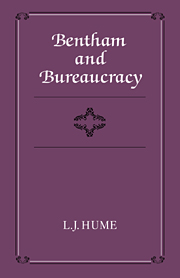Book contents
- Frontmatter
- Contents
- Preface
- Acknowledgements
- List of Abbreviations
- 1 Introduction
- 2 Government in eighteenth-century thought
- 3 The foundations of Bentham's thought: the Comment, the Fragment, the Introduction and Of Laws in General
- 4 Further explorations in jurisprudence
- 5 From principles to practice: the Panopticon and its companions
- 6 From the Panopticon to the Constitutional Code
- 7 The Constitutional Code and Bentham's theory of government
- 8 Conclusion
- Notes
- Bibliography
- Index
- Cambridge Studies in the History and Theory of Politics
- Frontmatter
- Contents
- Preface
- Acknowledgements
- List of Abbreviations
- 1 Introduction
- 2 Government in eighteenth-century thought
- 3 The foundations of Bentham's thought: the Comment, the Fragment, the Introduction and Of Laws in General
- 4 Further explorations in jurisprudence
- 5 From principles to practice: the Panopticon and its companions
- 6 From the Panopticon to the Constitutional Code
- 7 The Constitutional Code and Bentham's theory of government
- 8 Conclusion
- Notes
- Bibliography
- Index
- Cambridge Studies in the History and Theory of Politics
Summary
It is now possible to answer the questions posed in the introduction, to show how Bentham was able to develop his very detailed and in many respects prescient programme for the reform and re-arrangement of British government, and to show how he was able to develop the sophisticated theory of administrative processes and other matters which accompanied his programme. But, as was also foreshadowed in the introduction, the answers must be lengthy and complex.
Their starting point is that many elements in both Bentham's programme and his theory were borrowed from others. He was immersed in a certain kind of thinking about politics and government that was common in the eighteenth century. Its fundamental feature was that it brought together in a particular way the two great themes of modern political thought, individualism and the modern sovereign state. It respected and tried to preserve individualist notions and values, especially the beliefs that individual interests should have moral priority, that individuals are naturally autonomous and that social and political institutions are artifacts. At the same time it recognized the fragility of groupings composed only of autonomous individuals and held together only by their interests, and it offered the state, that is the central government, as an additional and decisive source of cohesion and discipline. It therefore aspired to make the government the effective master of the community in which it was located, and it sought to do so by equipping the state with institutions and instruments which would render the community responsive to its wishes.
- Type
- Chapter
- Information
- Bentham and Bureaucracy , pp. 238 - 258Publisher: Cambridge University PressPrint publication year: 1981

